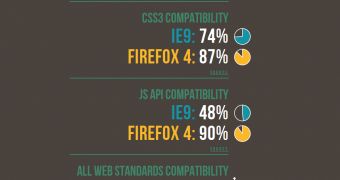With both Firefox 4 and Internet Explorer 9 getting close to a stable release, it seems like the battle is heating up. With the IE9 release candidate just out, Mozilla is taking Microsoft to task about some of its claims and, what it believes to be, misleading marketing.
Mozilla evangelist Paul Rouget asks the simple question "Is IE9 a modern browser?" and answers it himself with the equally simple "NO."
The issue comes from the fact that, while IE bills itself as a modern browser, Mozilla says that it's more on par with the old Firefox 3.6 rather than the upcoming Firefox 4.0.
Rouget questions a table taken from a Microsoft post showcasing IE9 support for various web standards including HTML5 and CSS3. From the data Microsoft provides, IE9 is shown to pass 100 percent of all tests related to the standards.
"Does IE9 support 99% of the HTML5 specification as insinuated by Microsoft? No, they're actually pretty far from it. The tests Microsoft are referring to are the ones they created during the development of IE9," Rouget writes.
"It's not that surprising that they pass the very tests they used to design and develop the browser... The primary use case for these tests, however, is to spot regressions and validate code changes," he explains.
Rouget goes on by showcasing the results of some "real-world" tests and chooses caniuse.com and html5test.com. According to those standard-compliance tests, Firefox 4.0 scores much higher than IE9. In fact, even Firefox 3.6 scores better.
Further down in his post he lists some of the modern web features that Firefox 4.0 supports and IE9 doesn't, things like offline support for web apps, WebWorkers, many CSS3 transitions or WebGL. He also provided a very nice looking infographic touting Firefox's superiority.
It's clear that Microsoft is being a bit misleading, it supports some parts of HTML5, CSS3 and so on, but there are plenty of features that IE9 does not support and won't support in the near future.
This while, Firefox, Chrome and others continue to work on more advanced stuff like WebGL, offline access the HTML5 File API and so on.
Of course, it's Microsoft's choice to support the features it believes are relevant and the fact is that many unsupported ones are hardly available in the wild anyway. But that doesn't give you the right to imply that you're 100 percent compatible with the HTML5 standard.
Despite claiming loftier goals, like the open web, accessibility, the power of information and what have you, all browser makers want their product to be the most popular. And the fact that there are now three main competitors, four if you count Safari, where not so long ago there was just IE, only makes the battle more intense, with all browser makers competing to make their creation look best.

 14 DAY TRIAL //
14 DAY TRIAL //